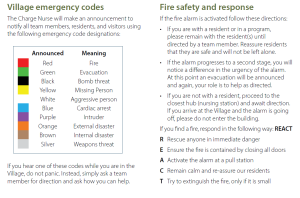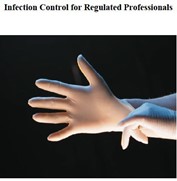Section 3: Lab Requirements
Lab Safety
General Safety
For emergencies in the lab or on campus:
- IAHS campus
- If located at the IAHS, dial 88 for security/emergency medical response team.
- Fennell campus
- Mohawk Security Services can be reached at all campuses, 24 hours a day: 905-575-2003 or 905-574-5111
- In case of emergencies at Fennell Campus, use any of the 108 hallway intercoms or 18 assistance phones located on college property. These phones provide a quick, one button connection to security, 24 hours a day
- Tansley Woods campus:
Don’t attempt to do anything which you feel is unethical, unsafe or beyond your capacity. If this concern arises during your lab courses, contact the appropriate course faculty for clarification and guidance.
During lab courses, follow the policies and procedures provided. To protect yourself and others, a College incident form must be filled out when any incident occurs. A copy of any incident report occurring on placement must be provided to Program Coordinator.
See Section 7 of this Handbook for additional detailed information on campus safety and security.
CVT
Techniques for Moving Patients
- Stand as close as possible to the load.
- Spread feet apart for balance, and keep floor area clear.
- Squat down (knees bent) while supporting your spine in a straight line.
- Grip load securely, keeping your spine straight to support the load.
- Use your arms and legs to transmit the power to lift.
- Give only the assistance needed to aid the patient in moving.
- Always transfer across the shortest distance.
- Always assist the patient at their weak side, and move them towards their unaffected side, and whenever practical towards you.
- To prevent slipping, lock all wheels on chairs, beds and stretchers.
- To aid in transfer and to obtain the patient’s co-operation tell them what you are going to do in a step-by-step manner, and give simple, short commands.
- Always get sufficient help for lifting when needed.
MT
Massage Therapy students are expected to demonstrate:
- Proper use of the equipment found in the labs, clinic, and signed out for outreaches. Students are required to check equipment on a daily basis and inform clinic supervisors of any damaged or missing items.
- Ability to leave the lab areas clean, tidy and organized
Accident Prevention
Please note: Food and drink, other than water in a closed container, are not allowed in the lab/ clinic at any time.
While you are a student, Massage Therapy labs and clinics are your professional workspaces. Keep your workspace clean, uncluttered, and organized (as per CMTO Standards of Practice). To avoid clutter and the possibility of accidents, coats, backpacks and extra supplies must be left in student lockers.
Every student is responsible for keeping the lab area clean and safe for self and others. Clean your work area after each use, and place linens used in the clinic in the linen bags provided. Any student who fails to respect requirements for keeping the learning environment safe and clean may be denied entry.
Health History
As Regulated Health Care Providers, Massage Therapy Professors and Technologists must follow the Standards of Practice of their regulatory College. This means they are obligated to review each student’s health history information prior to allowing them to participate in any practical capacity in the program.
- You are required to complete the Health History form, stating all your known medical conditions. You must update this form any time there is a change to your health status, or annually at a minimum, as per CMTO Standards of Practice (See Appendix 9.2a)
- Your instructors will review your Health History form and reserve the right to prohibit/restrict your involvement in practical classes based on information you provide.
- Fellow students will have access to your health history information for evaluation and treatment planning, and are required to follow their expressed commitment to confidentiality.
- Acting in the role of client is as valuable an education experience as acting in the therapist role. Once you have been informed of the reasons, benefits, risks, side effects, etc. (as per CMTO Standards of Practice), you will be required to sign the Mohawk College Massage Therapy Program Student Agreement before being permitted to participate in the role of client in any practical application demonstration, practice, or simulation).
- Note that, when acting in the role of client, you have the right to withdraw consent at any time as specified in the Regulated Health Professions Act (RHPA)
Confidentiality
- All Massage Therapy faculty, staff, and students are responsible for preserving and protecting confidential client information.
- The Personal Health Information Protection Act (PHIPA) defines confidential client information as follows:
- any information that relates to the physical or mental health of the individual, including information that consists of the health history of the individual’s family;
- any information that relates to the provision of health care to the individual, including the identification of a person as a provider of health care to the individual
- All Mohawk College Massage Therapy students and faculty are required to ensure that client information always remains confidential. This includes maintaining the confidentiality of lab partners, demonstration clients, simulated clients, and clinic clients, except as allowed or required by law.
Infection Control for Regulated Professionals
Students are required to understand and apply evidence-based best practices in infection prevention and control by routinely cleaning clinic space and equipment. These guidelines are outlined in the CMTO document Infection Control for Regulated Professionals.
PHARM TECH
- Students are to report any accidents, injury or malfunctioning to the instructor(s) immediately.
- Students to also report the unsafe actions of others or unsafe environments/practices to the professor or program coordinator for further action.
- For persons in need of medical aid, dial “88” from a campus phone for EMS to arrive. If an incident involves any of the lab chemicals, pull the MSDS from the WHMIS binder. Any other emergencies on campus also to dial “88” on the lab phone.
- McMaster and IAHS Campus specific emergency numbers/procedures are posted in each lab room near lab room phone. Including contacts/locations for first aid, CPR and AED.
- Eyewash station available in Room 239, and is checked weekly. First Aid kits available in Rooms 239 and 241 and is checked annually.
- Accident/Incident Reports need to be completed when an accident/incident occurs. Forms are available through the Square or Program Administration offices. Forms are also available on the website’s Occupational Health and Safety page.
- Students are not to be in designated lab areas unsupervised.
- Medications are to be secured when not in use, in locked rooms or in locked cabinets that only faculty have access to. Medications are never to leave the designated lab rooms.
- Pharmacist (or delegated Pharmacy Technician) on site whenever a lab is running/accessible.
- Students to report any allergies to faculty at the beginning of the semester and have an action plan in place (see Section 6 – Allergies).
- Don’t attempt to do anything which you feel is unethical, unsafe or beyond your capacity. If this concern arises during your placement, contact the appropriate faculty for clarification and guidance.
Failure to comply with the code of conduct or safety protocols (and the rules with in the lab course module) will result in the student being excused from the lab and if warranted the student will be expected to make up the time lost during their free time when they are better prepared to comply (see Attendance Requirement, Section 2 and Section 3, in Program Handbook).
The laboratory is intended to simulate the environment in which you will practice as a pharmacy professional and thus the grading of assignments may include factors which would be a part of employee appraisals, such as the ability to follow guidelines/policies.


